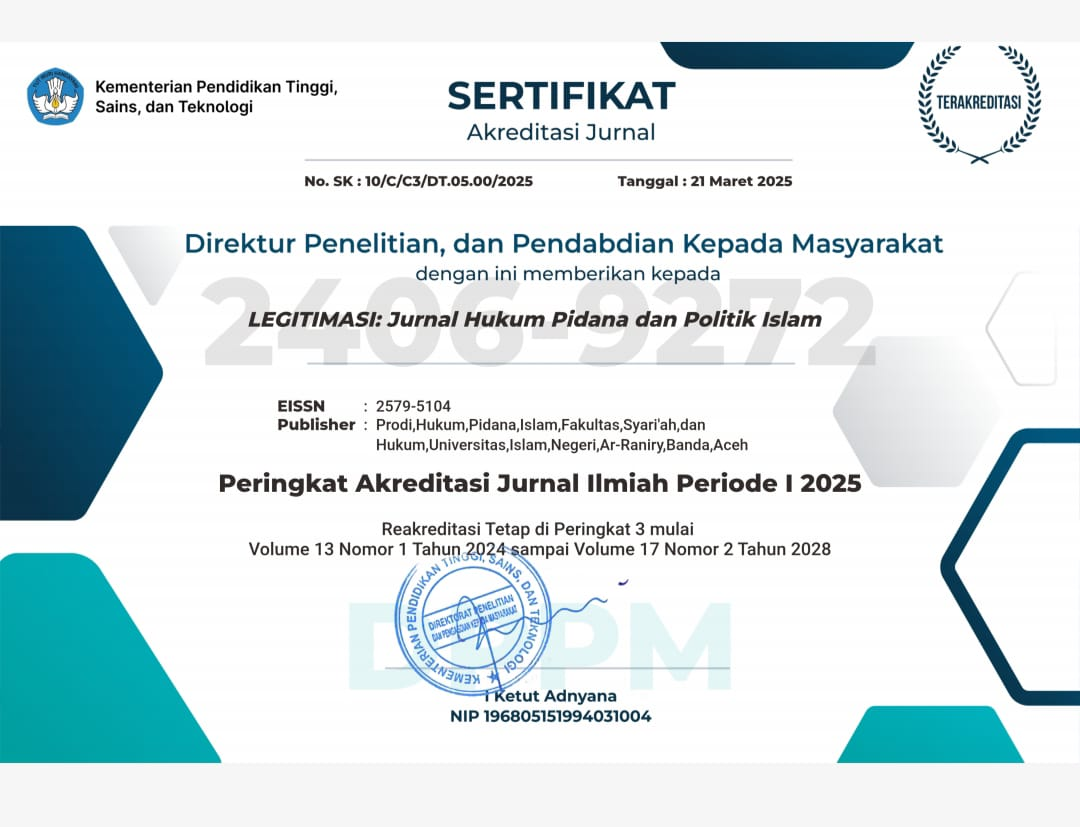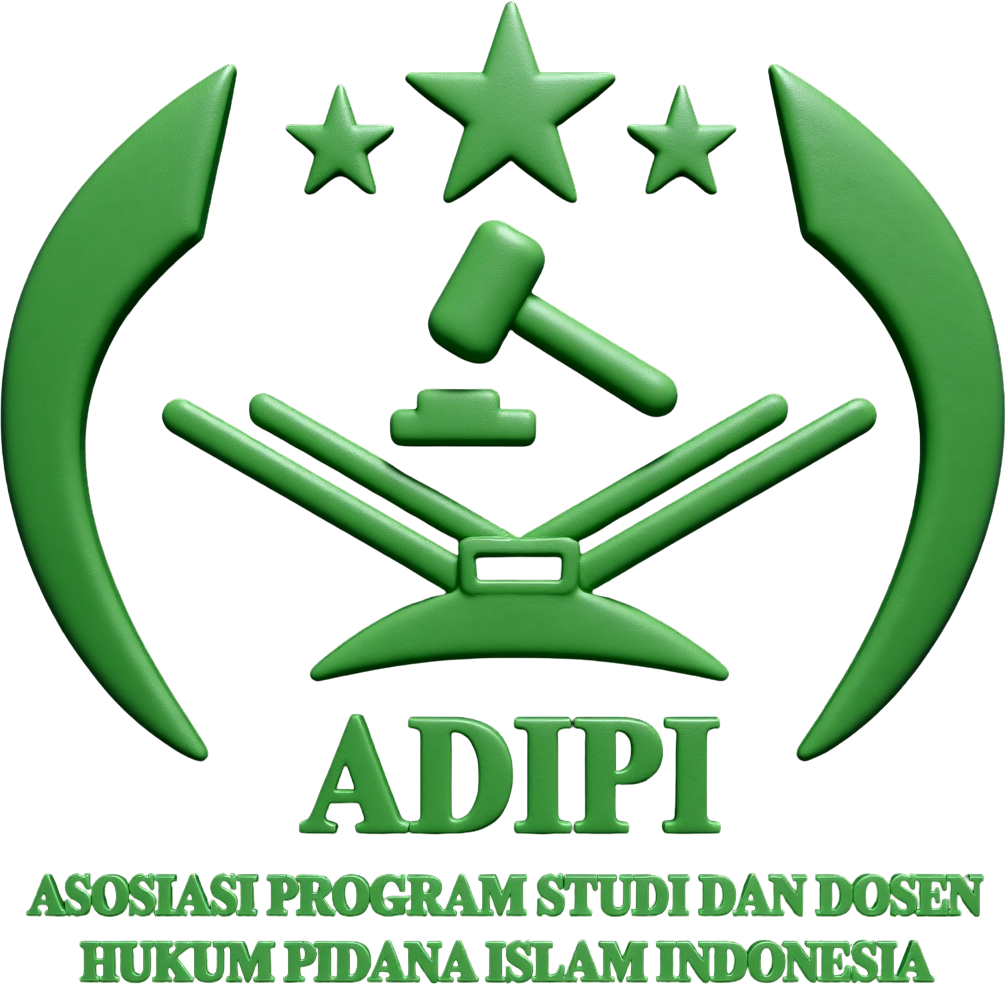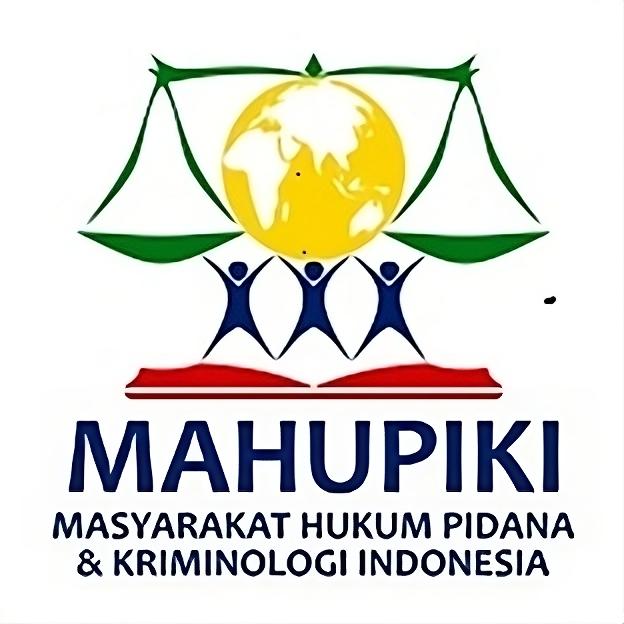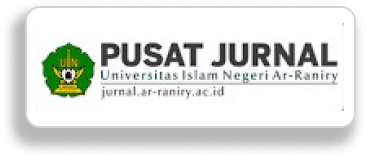Sentencing of Juvenile Narcotics Offenders in the Sidoarjo District Court
DOI:
https://doi.org/10.22373/legitimasi.v13i2.26320Keywords:
Crime, Narcotics, Juvenile, Criminal JusticeAbstract
This research aims to answer the question of the judge's considerations in deciding a narcotics criminal case involving a child at the Sidoarjo District Court. And why is a form of legal protection provided to a child found guilty of committing a narcotics crime at the Sidoarjo District Court? This study is a legal research using a statute approach and a case approach. The analysis was carried out using qualitative juridical methods. The research found that the sentencing of a child in a narcotics case at the Sidoarjo District Court, based on Decision No. 12/Pid.Sus-Anak/2021/PN.Sda, considered the violation of Article 112 (1) of the Narcotics Law, the child’s confession, witness testimony, and evidence. The judge also took into account the child's age, emotional stress from parental divorce, and applied a restorative justice approach, opting for a six-month work training at Marsudi Putra Social Welfare Institution for rehabilitation, involving family, legal counsel, and the Probation Office.References
Afzal, Muhammad, and Muhammad Khubaib. “Flexibility in the Implementation of Islamic Criminal Law in Modern Islamic Society in the Light of Qur’ān and Sunnah.” Journal of Islamic Thought and Civilization 11, no. 1 (2021).
Al-Dawoody, Ahmed, and Vanessa Murphy. “International Humanitarian Law, Islamic Law and the Protection of Children in Armed Conflict.” International Review of the Red Cross, 2019.
Analiansyah, and Ali Abubakar. “Children Handling Procedure in Islamic Criminal Offense in Aceh.” Ahkam: Jurnal Ilmu Syariah 21, no. 1 (2021).
Anggraeni, Anggita. “Penal Mediation as Alternative Dispute Resolution: A Criminal Law Reform in Indonesia.” Journal of Law and Legal Reform (2020), 1, no. January (2020): 369–80.
Anwar, Mashuril, and M. Ridho Wijaya. “Fungsionalisasi Dan Implikasi Asas Kepentingan Terbaik Bagi Anak Yang Berkonflik Dengan Hukum: Studi Putusan Pengadilan Tinggi Tanjung Karang.” Undang: Jurnal Hukum 2, no. 2 (2019): 265–92.
Auda, Jasser. Maqasid Shariah as Philosophy of Islamic Law: A Systems Approach. Edited by I. London: IIIT, 2007.
Badu, Lisnawaty W., and Julisa Aprilia Kaluku. “Restorative Justice in The Perspective of Customary Law: A Solution to The Settlement of Narcotics Crimes Committed by Children.” Jambura Law Review 4, no. 2 (2022).
Baidawi, Susan, and Rubini Ball. “Child Protection and Youth Offending: Differences in Youth Criminal Court-Involved Children by Dual System Involvement.” Children and Youth Services Review 144 (2023).
Beckman, Kara J., Patricia I. Jewett, Angeline Gaҫad, and Iris W. Borowsky. “Reducing Re-Arrest Through Community-Led, Police-Initiated Restorative Justice Diversion Tailored for Youth.” Crime and Delinquency 70, no. 10 (2024).
Hafiz, Ramdani Abd, Rodliyah, and Ufran. “Perlindungan Hukum Terhadap Anak Pelaku Tindak Pidana Narkotika Dalam Sistem Peradilan Pidana Anak.” Kertha Semaya: Journal Ilmu Hukum 10, no. 2 (2022): 356–70.
Hudson, Barbara. “Restorative Justice and Gendered Violence: Diversion or Effective Justice?” British Journal of Criminology, 2002.
Larner, Samuel, and Hannah Smithson. “‘How Can You Punish a Child for Something That Happened over a Year Ago?’ The Impacts of COVID-19 on Child Defendants and Implication for Youth Courts.” Journal of Criminal Law 87, no. 4 (2023).
Latipah, Eva, Hanif Cahyo Adi Kistoro, Fitria Fauziah Hasanah, and Himawan Putranta. “Elaborating Motive and Psychological Impact of Sharenting in Millennial Parents.” Universal Journal of Educational Research 8, no. 10 (2020).
Lipovsky, Julie A., Ritchie Tidwell, Jayne Crisp, Dean G. Kilpatrick, Benjamin E. Saunders, and Vickey L. Dawson. “Child Witnesses in Criminal Court - Descriptive Information from Three Southern States.” Law and Human Behavior 16, no. 6 (1992).
Listyarini, Dyah. “JUVENILE JUSTICE SYSTEM THROUGH DIVERSION AND RESTORATIVE JUSTICE POLICY.” Diponegoro Law Review 2, no. 1 (2017).
Mitskaya, Elena. “Theoretical Thoughts on Legal Regulation of Mediation in Criminal Process in Kazakhstan.” International Journal of Criminal Justice Sciences 15, no. 1 (2020).
Nashriana, Desia Rakhma Banjarani, Marwin S. Del Rosario, and Vera Novianti. “Enhancing Restorative Justice in Indonesia: Exploring Diversion Implementation for Effective Juvenile Delinquency Settlement.” Sriwijaya Law Review 7, no. 2 (2023).
Rahman, Faiz. “CONTEXTUALIZING RESTORATIVE JUSTICE THROUGH DIVERSION MECHANISM: A STUDY OF INDONESIA’S JUVENILE JUSTICE SYSTEM.” Indonesia Law Review 9, no. 3 (2019).
Rizanizarli, Rizanizarli, Mahfud Mahfud, Riza Chatias Pratama, and Fikri Fikri. “The Application of Restorative Justice for Children as Criminal Offenders in the Perspective of National Law and Qanun Jināyat.” Samarah 7, no. 1 (2023).
Rochaeti, Nur, and Nurul Muthia. “Socio-Legal Study of Community Participation in Restorative Justice of Children in Conflict with the Law in Indonesia.” International Journal of Criminology and Sociology 10 (2021).
Saeed, Abdullah. Human Rights and Islam: An Introduction to Key Debates between Islamic Law and International Human Rights Law. Human Rights and Islam: An Introduction to Key Debates between Islamic Law and International Human Rights Law, 2018.
SAIDAH. “COUNTERPRODUCTIVE OF DIVERSION FOR CHILDREN IN CONFLICT WITH THE LAW: THE CONTEXT OF LEGAL IMPOSITION FROM THE PERSPECTIVE OF ISLAMIC LAW.” Russian Law Journal 11, no. 3 (2023).
Sliva, Shannon M., and Mark Plassmeyer. “Effects of Restorative Justice Pre-File Diversion Legislation on Juvenile Filing Rates: An Interrupted Time-Series Analysis.” Criminology and Public Policy 20, no. 1 (2021).
Sudewo, Fajar Ari, Hamidah Abdurrachman, and Fajar Dian Aryani. “The Application of Restorative Justice System through the Diversion of Children in Conflict with Laws in Central Java Polda (Regional Police of the Republic of Indonesia).” International Journal of Psychosocial Rehabilitation 24, no. 2 (2020).
Sumardi, Dedy, Mansari Mansari, and Maulana Fickry Albaba. “Restoratif Justice, Diversi Dan Peradilan Anak Pasca Putusan Mahkamah Konstitusi Nomor 110/Puu-X/2012.” Legitimasi: Jurnal Hukum Pidana Dan Politik Hukum 11, no. 2 (2022): 248–65.
Susanti, Dewi Elvi. “Pemidanaan Terhadap Anak Sebagai Pelaku Tindak Pidana Studi Kasus Perkara Pidana No. 07/Pid-Sus-Anak/2017/Pn. Pdg.” JCH (Jurnal Cendekia Hukum) 4, no. 2 (2019): 187–206.
Suzuki, Masahiro, and Tamera Jenkins. “The Role of (Self-)Forgiveness in Restorative Justice: Linking Restorative Justice to Desistance.” European Journal of Criminology 19, no. 2 (2022).
Utami, Yulia, and Muhamad Hasan Sebyar. “Analisis Pemidanaan Terhadap Anak Sebagai Pengedar Narkotika Dalam Perspektif Psikologi Kriminal.” Journal of Law and Nationation 2, no. 4 (n.d.): 381–97.
Weinrath, Michael, and Braeden Broschuk. “Police and Crown Prosecutor Use of Restorative Justice and Diversion for Adults and Youth in a High-Crime Area.” Canadian Journal of Criminology and Criminal Justice 64, no. 4 (2022).
Zainuddin, Muslim, Mukhsin Nyak Umar, Dedy Sumardi, Mansari Mansari, and Zakki Fuad Khalil. “Protection of Women and Children in the Perspective of Legal Pluralism: A Study in Aceh and West Nusa Tenggara.” Samarah: Jurnal Hukum Keluarga Dan Hukum Islam Hukum Islam 8, no. 3 (2024): 1948–73.
Downloads
Published
Issue
Section
License
Authors who publish in Legitimasi: Jurnal Hukum Pidana dan Politik Hukum agree to the following terms:
- Authors retain copyright and grant the journal right of first publication with the work simultaneously licensed Attribution-ShareAlike 4.0 International (CC BY-SA 4.0) that allows others to share the work with an acknowledgment of the work's authorship and initial publication in this journal.
- Authors are able to enter into separate, additional contractual arrangements for the non-exclusive distribution of the journal's published version of the work (e.g., post it to an institutional repository or publish it in a book), with an acknowledgment of its initial publication in this journal.
- Authors are permitted and encouraged to post their work online (e.g., in institutional repositories or on their website) prior to and during the submission process, as it can lead to productive exchanges, as well as earlier and greater citation of published work. (See The Effect of Open Acces)












